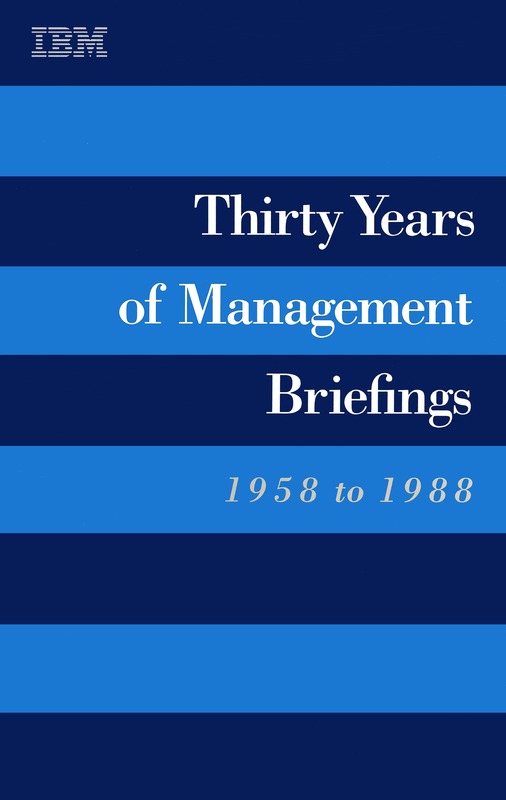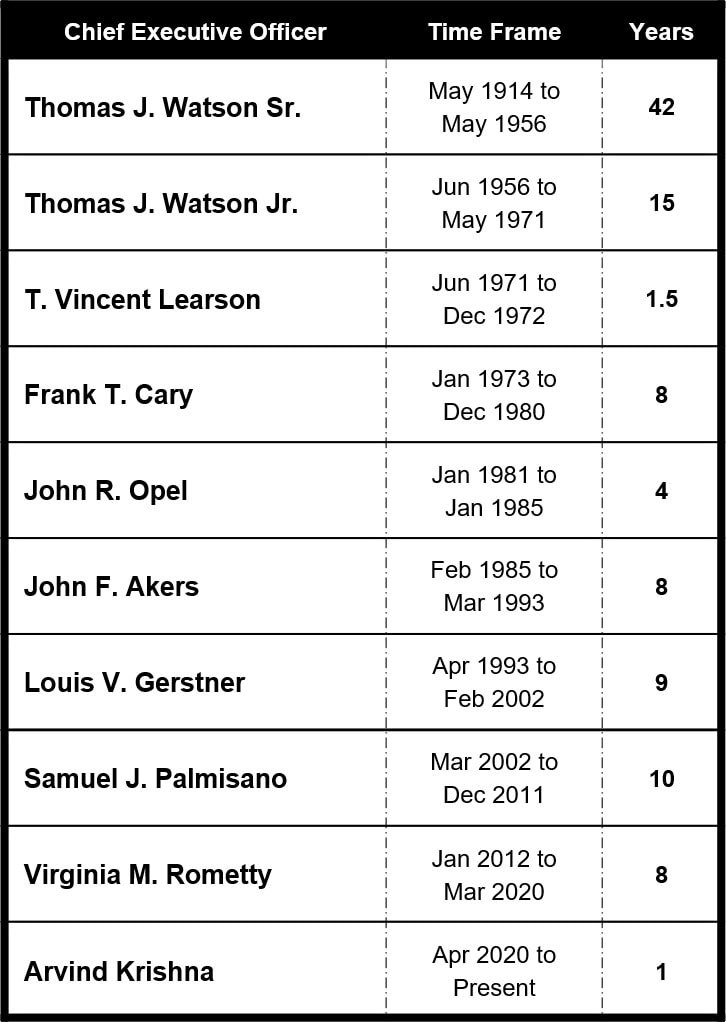A Review of "Thirty Years of Management Briefings: 1958-88"
|
|
Date Published: June 26, 2021
Date Modified: December 8, 2023 |
"A number of you have expressed a need for more information on company activities, policies and developments. To fill this need we are, with this issue, initiating Management Briefing.
"The basic purpose of this publication is to provide managers throughout the company with more background information about current IBM announcements and activities and explain to the greatest possible degree the "why" behind our policies. In addition, it will contain, from time to time, actual case studies which have an object lesson for the benefit of all management and which can help all of us to do a better job of managing our respective areas of the business."
"The basic purpose of this publication is to provide managers throughout the company with more background information about current IBM announcements and activities and explain to the greatest possible degree the "why" behind our policies. In addition, it will contain, from time to time, actual case studies which have an object lesson for the benefit of all management and which can help all of us to do a better job of managing our respective areas of the business."
Thomas J. Watson Jr., Management Brief Number #1, 1958
A Review of "Thirty Years of Management Briefings" by Tom Watson Jr.
- Reviews of the Day: 1988
- Selected Quotes from "Thirty Years of Management Briefs"
- This Author’s Thoughts and Perceptions
Reviews of the Day: 1988
|
This was an internal-only delivered publication. I doubt that any external reviews of this publication were ever done. I received my copy after completing "New Manager's School" in Armonk, New York in the late '80s.
Here is the Editor's Note that precedes this collection of Management Briefs from Thomas J. Watson, T. Vincent Learson, Frank T. Cary, John R. Opel, and John F. Akers. These Management Briefings capture a great deal of the spirit and substance underlying IBM's management philosophy as it has evolved during the last three decades. A few have been removed because current policy has evolved significantly since they were written nearly two decades ago. There are a number of others, all from that period, that may no longer reflect current policy and practice, or may use outdated language.
|
Selected Quotes from "Thirty Years of Management Briefs"
On taking vacations
"From time to time, I hear of managers who are somehow too busy to take their vacations. Some of you may feel that this is
a commendable attitude. I don't.
"We have a good vacation plan, and for a very good reason. Everybody needs a certain amount of change and rest to stay
healthy and to do his job properly. I think you owe it to yourself, as well as to the company, to make sure you take a vacation every year."
a commendable attitude. I don't.
"We have a good vacation plan, and for a very good reason. Everybody needs a certain amount of change and rest to stay
healthy and to do his job properly. I think you owe it to yourself, as well as to the company, to make sure you take a vacation every year."
Thomas J. Watson Jr., September 1962
As IBM faced the economic, political and competitive turmoil of the '70s
"You know as well as I that these are difficult times for IBM. The fact that this is a temporary situation - although when it will end we do not know - hardly eases the apprehension of employees who see things happening that they have not experienced before. They are being asked to work harder at a time when budgets are tight and promotion opportunities are fewer. Many are being inconvenienced by being asked to take different jobs or to relocate.
"All of these things are necessary. How well they are accomplished depends almost totally on you. ... The success of IBM always has been and will be based on its people. They have amply demonstrated their willingness to devote all their talents and skills to their company. You and I owe them skilled, understanding leadership for this is a proud, hard-hitting team - the best in the world - and we must keep it that way."
"All of these things are necessary. How well they are accomplished depends almost totally on you. ... The success of IBM always has been and will be based on its people. They have amply demonstrated their willingness to devote all their talents and skills to their company. You and I owe them skilled, understanding leadership for this is a proud, hard-hitting team - the best in the world - and we must keep it that way."
T. Vincent Learson, July 28, 1971
Editor's note: There is so much wisdom and insight into IBM's 20th Century management practices it is impossible to list them all without overdoing it. Just get this book!
This Author's Thoughts and Perceptions
|
Thirty Years of Management Briefings was my IBM first line manager "Bible." I received a copy after New Manager's School and it always remained on my desk. It replaced the "Management Briefings" three-hole punch binder.
Although it contains management letters from several IBM CEO's (Tom Watson Jr., T. Vincent Learson, Frank T. Cary, John R. Opel and John F. Akers), it is mainly a refreshing insight into the leadership and thoughts of Tom Watson Jr. Many of his thoughts are just extensions of his father's expressed in Human Relations and Men-Minutes-Money. Tom Watson Jr. believed in multiple forms of communication with IBMers. One of the ways he communicated with his managers was through these "Management Briefs." When he saw something that violated company policy, was an especially good or bad management practice, or supported or contradicted the IBM Basic Beliefs, he wrote his management about it. This was one of the ways he used to ensure his corporation stayed on track. One of my favorite Management Briefs is entitled "Object Lesson: The Man Who Grew a Beard." It reads like a Dr. Seuss story and addresses the IBM dress code. It ends with this observation:
|
These Management Briefs are from Watson Jr. through John Akers.
|
The corporate design program applies to things like products, buildings, publications and interior decor. Not to people. Obviously we want high standards of behavior and grooming in this organization. ... The object is to make sure we are always able to represent the IBM company in the best possible way. Not that we should all look alike, or be walking, talking replicas of our superiors. Let's not confuse propriety with uniformity.
Of course, these Management Briefings were just one of the processes that Tom Watson Jr. used during his time as chief executive officer to ensure his business practiced—as Alfred P. Sloan Jr. described General Motors in the 1920s and '30s—a "coordinated decentralization."
A few of the other processes are shown below.
A few of the other processes are shown below.
IBM was an amazing organization which executives need to understand to replicate its 20th Century successes and avoid its 21st Century mistakes.
Cheers,
- Pete
Cheers,
- Pete




